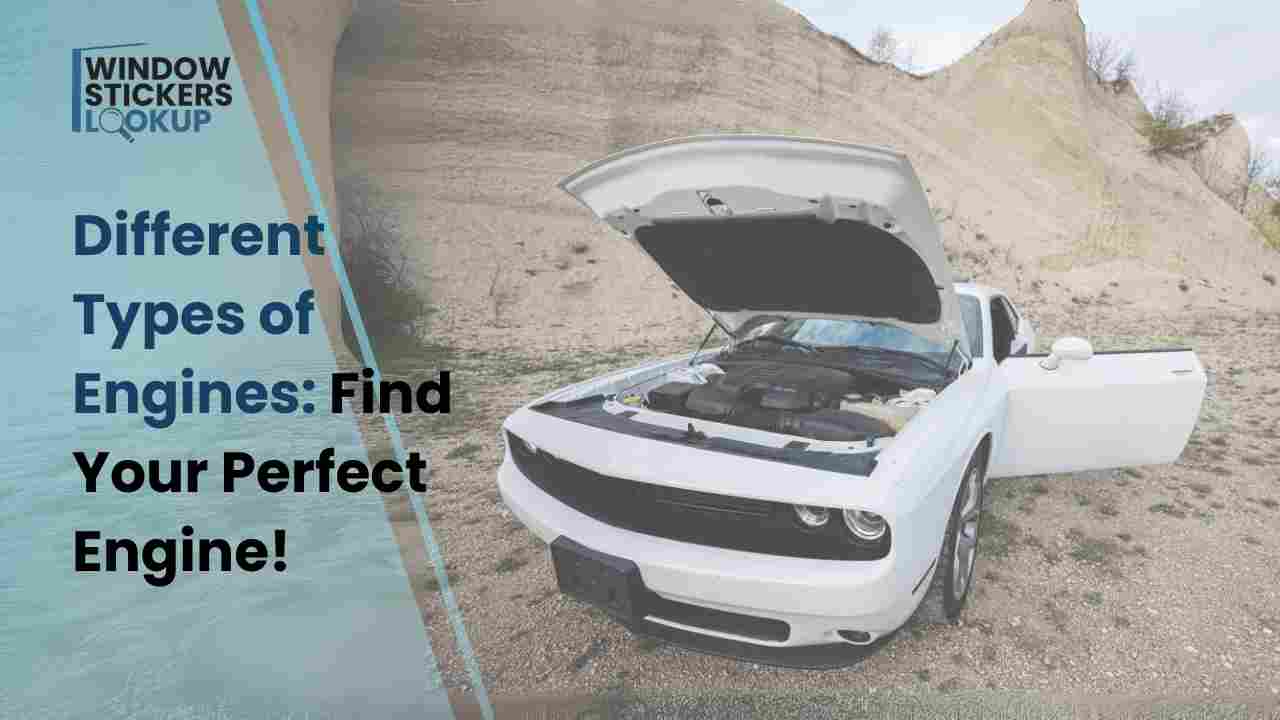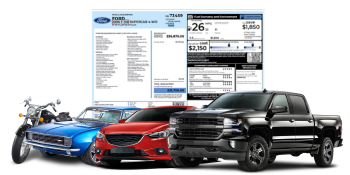Owning a car is more than just a mode of transport—it’s a commitment to fuel type, power, and performance. Yet, with all the engine options out there, choosing the right one can feel like a puzzle.
Each type offers unique strengths, and finding the best match for your lifestyle is essential. If you’re curious about your car’s engine or considering a new vehicle, understanding engine types can help you make a smarter choice.
By getting the car’s window sticker using a window sticker lookup tool, you can easily uncover detailed specifications for various engine types, so you know exactly what you’re getting.
RELATED: How Efficient is Your Car Engine?
Internal Combustion Engines
Internal combustion engines (ICE) are the most common type in vehicles today. They work by igniting fuel—usually gasoline or diesel—within cylinders, which creates a series of small explosions. These controlled explosions push a piston that rotates the engine’s crankshaft, converting the energy into motion.
The main parts of an internal combustion engine include pistons, a crankshaft, valves, and spark plugs. The spark plug ignites the fuel-air mixture, causing an explosion that moves the piston down. The crankshaft then converts this movement into the rotational force needed to power the vehicle.
Advantages
- Widely available fuel options.
- Provides strong acceleration and high power.
- Established technology with a vast support network.
Disadvantages
- Emits carbon dioxide and other pollutants.
- Less fuel-efficient than some alternatives.
- Typically requires regular maintenance and tune-ups.
Internal combustion engines power most gas and diesel cars, trucks, and SUVs. You can use our window sticker lookup tool to verify a car’s ICE type, power, and fuel economy.
Electric Engines
Electric engines are powered solely by electricity and stored in rechargeable batteries. Unlike combustion engines, electric motors don’t require fuel, making them incredibly efficient and environmentally friendly.
When you press the accelerator, an electric motor receives energy from the battery, producing instant torque that spins the wheels directly.
Since electric engines have fewer moving parts than ICEs, they’re generally quieter and need less maintenance. However, range limitations and charging infrastructure can still be challenging, though they’re improving every year.
Advantages
- Zero emissions, making them eco-friendly.
- High energy efficiency and low operating costs.
- Minimal maintenance due to fewer parts.
Disadvantages
- Limited driving range per charge.
- Longer refueling times compared to gasoline vehicles.
- Dependent on charging infrastructure, which varies by region.
Electric engines are popular in city cars, light-duty vehicles, and even some performance models. Are you curious if an electric vehicle (EV) is the right fit for you? Getting the EV window sticker can reveal specific details like battery size, range, and efficiency for different electric models.
Hybrid Engines
Hybrid engines combine an internal combustion engine with an electric motor. Depending on driving conditions, hybrids can switch between or simultaneously use both power sources.
In city driving, hybrids typically use electric power to save fuel, while at higher speeds, they might rely more on the internal combustion engine. Some hybrids can even recharge their batteries while braking, a process called regenerative braking.
Advantages
- Improved fuel efficiency by using electric power in low-demand scenarios.
- Lower emissions than standard internal combustion engines.
- Extended range compared to fully electric vehicles.
Disadvantages
- Higher upfront cost than gasoline-only vehicles.
- It can be more complex, with additional components to maintain.
- Battery lifespan and replacement costs can be a concern.
Hybrids are ideal for drivers who want improved fuel efficiency without fully transitioning to electric.
Alternative Fuel Engines
Alternative fuel engines run on non-traditional fuels, such as biofuels, hydrogen, and compressed natural gas (CNG). These engines offer unique benefits depending on the fuel type. For example, biofuel engines can reduce reliance on fossil fuels by using plant-based fuels.
Hydrogen engines produce only water vapor as exhaust, making them extremely clean. CNG engines, popular in buses and large fleet vehicles, emit fewer pollutants than gasoline engines.
While alternative fuel engines hold promise for reducing emissions, they’re still developing in terms of availability and infrastructure. Hydrogen, for instance, requires specialized fueling stations, which are limited in number.
Advantages
- Reduced emissions, especially with hydrogen and biofuels.
- Helps diversify energy sources beyond traditional fossil fuels.
- Can offer significant environmental benefits.
Disadvantages
- Limited refueling infrastructure for certain fuel types.
- Specialized maintenance may be required.
- Higher initial costs for both vehicles and fuel.
Alternative fuel engines are often found in specialized vehicles like buses, delivery trucks, and some passenger cars. If you’re curious about a specific alternative fuel vehicle, looking up the vehicle’s window sticker can help you find out exactly what powers it and what benefits it offers.
Advantages and Disadvantages of Each Engine Type
Each engine type has its strengths and weaknesses. Internal combustion engines are powerful and widely supported, while electric engines are clean and efficient. Hybrid engines strike a balance between the two, and alternative fuel engines offer new possibilities for reducing environmental impact.
- Internal Combustion: Reliable and powerful but less eco-friendly.
- Electric: Clean and low-maintenance but has limited range and needs charging infrastructure.
- Hybrid: Great fuel efficiency but complex and more expensive.
- Alternative Fuels: Environmentally promising but lack widespread infrastructure.
Understanding these pros and cons can help you weigh your options when looking for a new vehicle.
Common Applications of Different Engine Types
Internal combustion engines are found in nearly all gasoline and diesel vehicles, from compact cars to heavy-duty trucks. Electric engines dominate in city cars, light-duty vehicles, and luxury performance models.
Hybrid engines are common in eco-friendly cars and SUVs, balancing fuel efficiency and convenience. Alternative fuel engines are often seen in commercial applications, such as buses and specialized fleet vehicles, though they are slowly entering the consumer market.
With the window sticker lookup tool, you can know what engine type a car has, and also compare specs across different makes and models. Knowing what powers your car can help you plan for maintenance, fuel costs, and overall performance.
How Window Stickers Lookup Can Help
If you’re unsure about a vehicle’s engine type or want detailed specifications, getting the car’s window sticker offers a straightforward solution. You can access an accurate window sticker by providing the vehicle’s VIN, revealing engine type, fuel efficiency, power output, and more. This is especially helpful if you’re shopping for a car and want to compare engine options side-by-side.
Conclusion
Engines define a vehicle’s performance, efficiency, and environmental impact. From traditional internal combustion engines to the latest electric and hybrid models, each type has a unique role in today’s automotive landscape.
While some prioritize power, others focus on sustainability or efficiency. Whichever engine you prefer, understanding its mechanics and advantages can help you choose the best vehicle for your needs. With our window sticker lookup by VIN or license plate tool, getting precise information on any engine type is easy.
Frequently Asked Questions
What are the main types of engines?
The main types are internal combustion, electric, hybrid, and alternative fuel engines. Each has unique benefits, power, and efficiency levels.
How does an electric engine work?
An electric engine draws power from a battery and produces instant torque, directly driving the wheels. It’s efficient, quiet, and requires little maintenance.
What are the benefits of hybrid engines?
Hybrid engines combine electric and gasoline power, improving fuel efficiency and reducing emissions. They balance performance and eco-friendliness for everyday use.









